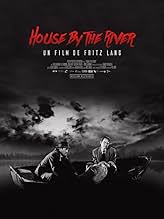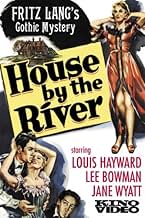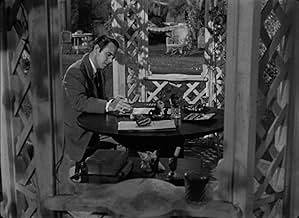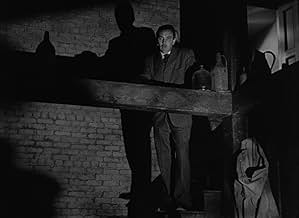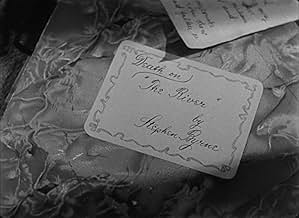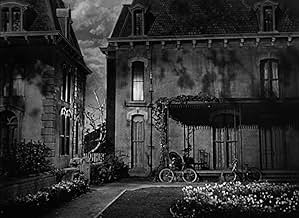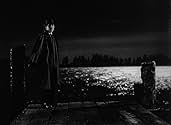VALUTAZIONE IMDb
7,0/10
4605
LA TUA VALUTAZIONE
Aggiungi una trama nella tua linguaA deranged writer murders a maid after she resists his advances. The writer engages his brother's help in hiding the body, causing unexpected problems for both of them.A deranged writer murders a maid after she resists his advances. The writer engages his brother's help in hiding the body, causing unexpected problems for both of them.A deranged writer murders a maid after she resists his advances. The writer engages his brother's help in hiding the body, causing unexpected problems for both of them.
- Regia
- Sceneggiatura
- Star
Bob Burns
- Courtroom Spectator
- (non citato nei titoli originali)
Edgar Caldwell
- Square Dancer
- (non citato nei titoli originali)
Edward Clark
- Minor Role
- (non citato nei titoli originali)
Frank Dae
- Col. Davis
- (non citato nei titoli originali)
Recensioni in evidenza
House by the River (1950)
A straight up Gothic murder scenario with echoes of the 1945 "Spiral Staircase." A family with two brothers at odds with each other is living in a house and one of them is a murderer. And at first only the audience knows who. Their relative isolation on the banks of a wide river means only that they will have little help when danger occurs. The neighbors and police and few and far.
Louis Hayward plays the main character, Stephen Byrne, a writer and a bit of a self-important cad. Hayward has an odd style on film during this era, attractive and likable at first, but with an acerbic humor and some kind of unworkable stiffness, as if you know he's always performing. But he's clever about it, and when you realize he isn't meant to be exactly lovable, he's pretty well cast. Byrne's brother, wife, and maid all come through with solid if uninspired performances, and you wonder exactly what held everyone back. Fritz Lang has many more successful melodramas than this one.
I think the weakness is largely the raw material, the story itself, which is a bit straight forward. One brother commits a murder, the other is drawn into helping cover it up, and then the tensions build between them as an inquest raises questions. It has moments, but there are no further twists that work. The ending is out of character, almost comical in its false (and unlikely) horror.
Along the way, though, are a series of nice scenes, inside the house at night, along the river at night, at a party meant to hide the killer's guilt, and so on. The music is especially helpful in jabbing the audience at key moments. American Georges Antheil was a composer famous for his avant-garde pieces in the 1920s in Europe before settling into a Hollywood routine. You can detect, and appreciate, the edge he brings to the score. The photography by contrast is good without rising up to the possibilities of these kinds of settings--the house, the river, the dock, all have more dramatic potential that we just don't see.
A straight up Gothic murder scenario with echoes of the 1945 "Spiral Staircase." A family with two brothers at odds with each other is living in a house and one of them is a murderer. And at first only the audience knows who. Their relative isolation on the banks of a wide river means only that they will have little help when danger occurs. The neighbors and police and few and far.
Louis Hayward plays the main character, Stephen Byrne, a writer and a bit of a self-important cad. Hayward has an odd style on film during this era, attractive and likable at first, but with an acerbic humor and some kind of unworkable stiffness, as if you know he's always performing. But he's clever about it, and when you realize he isn't meant to be exactly lovable, he's pretty well cast. Byrne's brother, wife, and maid all come through with solid if uninspired performances, and you wonder exactly what held everyone back. Fritz Lang has many more successful melodramas than this one.
I think the weakness is largely the raw material, the story itself, which is a bit straight forward. One brother commits a murder, the other is drawn into helping cover it up, and then the tensions build between them as an inquest raises questions. It has moments, but there are no further twists that work. The ending is out of character, almost comical in its false (and unlikely) horror.
Along the way, though, are a series of nice scenes, inside the house at night, along the river at night, at a party meant to hide the killer's guilt, and so on. The music is especially helpful in jabbing the audience at key moments. American Georges Antheil was a composer famous for his avant-garde pieces in the 1920s in Europe before settling into a Hollywood routine. You can detect, and appreciate, the edge he brings to the score. The photography by contrast is good without rising up to the possibilities of these kinds of settings--the house, the river, the dock, all have more dramatic potential that we just don't see.
The most interesting aspect of House By The River is the fact that it was produced at Republic Pictures, the home of Roy Rogers and several other B movie cowboys and the values those pictures put forth. Hardly the place for a moody and atmospheric thriller that examines a man's moral degeneracy directed by Fritz Lang who always likes to explore the dark. One thing that does mark this as a Republic film is the usual Herbert J. Yates economy.
But for a director like Lang who was used to exploring shadowy worlds, economy on the set isn't a hindrance, though back in Germany this man directed the opulent Metropolis. House By The River delivers the most for its meager budget.
Louis Hayward who was a poor man's Tyrone Power and like Power could play straight heroes and hero/heels gets his Nightmare Alley type role as the rich and idle writer who just can't move the writer's block. He takes a real fancy to maid Dorothy Patrick and when she repulses his advances, Hayward kills her. He gets older and club footed brother Lee Bowman to dump the body in the river. But as dead bodies will do, they bloat and have a nasty habit of floating to the top.
Lang and Hayward create a really frightening picture of moral degeneracy that would have resonated well with post World War II audiences who had just defeated a nation gripped in the philosophy that it was a race of super people. Jane Wyatt gets her innings in playing Hayward's wife who Bowman also loved and who starts thinking that maybe she married the wrong brother.
I have to single out Jody Gilbert from the cast who plays Bowman's housekeeper and who Bowman takes his frustrations out on after he's helped Hayward. She's not the sharpest knife in the drawer and misreads all of Bowman's signals and later does him damage at a coroner's inquest.
I'm not sure how much money House By The River brought in to Republic Pictures, but it is a minor masterpiece for this studio.
But for a director like Lang who was used to exploring shadowy worlds, economy on the set isn't a hindrance, though back in Germany this man directed the opulent Metropolis. House By The River delivers the most for its meager budget.
Louis Hayward who was a poor man's Tyrone Power and like Power could play straight heroes and hero/heels gets his Nightmare Alley type role as the rich and idle writer who just can't move the writer's block. He takes a real fancy to maid Dorothy Patrick and when she repulses his advances, Hayward kills her. He gets older and club footed brother Lee Bowman to dump the body in the river. But as dead bodies will do, they bloat and have a nasty habit of floating to the top.
Lang and Hayward create a really frightening picture of moral degeneracy that would have resonated well with post World War II audiences who had just defeated a nation gripped in the philosophy that it was a race of super people. Jane Wyatt gets her innings in playing Hayward's wife who Bowman also loved and who starts thinking that maybe she married the wrong brother.
I have to single out Jody Gilbert from the cast who plays Bowman's housekeeper and who Bowman takes his frustrations out on after he's helped Hayward. She's not the sharpest knife in the drawer and misreads all of Bowman's signals and later does him damage at a coroner's inquest.
I'm not sure how much money House By The River brought in to Republic Pictures, but it is a minor masterpiece for this studio.
Failing novelist Stephen Byrne (Louis Hayward) murders his maid and manipulates his brother John (Lee Bowman) into helping him dispose of the body. Later, after it has been found, he sees a chance to pin the crime on John, whom he eventually tries to kill, too (making it look like suicide). 'House by the River' is suffering from one essential downside: The plot is illogical. While Stephen does everything to let suspicion fall on his brother, he is at the same time working on a new novel (following the advice of a neighbour to focus on things he knows) about a murder - a novel that is as good as an admission of guilt. And if he puts all this into that novel, which after all he intends to publish, why is he so desparate to prevent his wife Marjory (Jane Wyatt) from reading the manuscript? Despite all this, I am rating 'House by the River' 7 stars. That is because it is well-acted and beautifully photographed. Especially the eerie scenes on the river (with its murky and brackish water) are great. In sum, this is by no means one of Fritz Lang's best films, far from it. But it has some important points in its favour.
Intense period thriller about a writer, Stephen Byrne (played by Louis Hayward), who lives in - yeah, you guessed it - a house by the river; with lovely yard and gazebo, yet oddly dark as the film opens with the sky clouded, shadows cast across scenery, haunting music, a dead animal floating by on the glistening water, and a black widow spider crawling over his writing. We meet the attractive, blonde servant girl, Emily, who Stephen clearly has a lustful eye on from the get-go. By the next scene, he tries to kiss her coming down the stairs after bathing in his tub, and, well, she screams and he "accidentally" strangles her. With his brother assisting him, they put her body in a big sack and sink her in the river, then follows the cover-up of the murder.
Well, this film is quite interesting, dark and suspenseful - there's a lot going on here. The print I saw looked strikingly full of sharp black and white contrast. The photography in this makes the film menacing with blackened rooms lit only by candle light casting dark, sharp shadows across the walls, some extreme camera angles up stairs and down halls, shots of faces seen only in mirrors, extreme close-ups, and sweat dripping on the face of a nervous murderer.
Well, this film is quite interesting, dark and suspenseful - there's a lot going on here. The print I saw looked strikingly full of sharp black and white contrast. The photography in this makes the film menacing with blackened rooms lit only by candle light casting dark, sharp shadows across the walls, some extreme camera angles up stairs and down halls, shots of faces seen only in mirrors, extreme close-ups, and sweat dripping on the face of a nervous murderer.
House by the River is directed by Fritz Lang and adapted by Mel Dinelli from A.P. Herbert's novel The House on the River. It stars Louis Hayward, Jane Wyatt, Lee Bowman & Dorothy Patrick. Music is by George Antheil and photography by Edward J. Cronjager.
Novelist Stephen Byrne (Hayward) makes a play for the house maid and unwittingly kills her when she repels his advances. Enlisting the help of his disabled brother, John (Bowman), to dispose of the body in the river, Stephen suddenly finds that the publicity surrounding the maid's disappearance has put him in vogue again. In fact he finds his muse sufficiently stoked enough to craft another novel. But as easy as Stephen finds it easy to have no conscience, the opposite is the case with John, and with the river refusing to hold its secrets, something is going to give.
Working out of Republic pictures, Lang refused to let the low budget production hamper his vision of a bleak Cain & Abel like Gothic-noir-melodrama. He did, however, meet some resistance when requesting that the maid be played by a black woman, which was quickly shot down by nervous executives at the famed "B" movie studio. House by the River is far from being among the best of Lang's work, but the final product is still a triumph considering it's basically a three character piece set virtually in just two locations. It scores high on eerie atmosphere and finds Lang dealing in moral bankruptcy/responsibility and the eye for an eye mentality. Ushered into the narrative, too, is a Lang fave of people irked by loving someone they can't have. These themes allow the director to gloss over the simple script and dally in some truly arresting visuals.
Aided considerably by Cronjager's (Desert Fury/CanyonPassage) chiaroscuro photography, Lang's film is a lesson in how to maximise effect from limited sets. The actual house on the river, and that of the neighbour (resplendent with creepy scarecrow in garden), has a very disquiet feel to it, fronted by shimmering water that carries the dead carcass' of animals, it's a most haunting setting. And the eerie atmosphere continues inside the house, where shadows work their wonders and Antheil's music sticks rigidly (and rightly) to the creaky house formula. The cast don't pull up any trees, but they don't need to. Hayward is perhaps too animated for a study in snide villainy, but it works and he has a nice line in visual mocking. The rest fall in line for what is required, with the best of the bunch being Ann Shoemaker as nosey neighbour Mrs. Ambrose.
Once a hard to find film, House by the River is now easily accessible after gaining a DVD release (the print is fine, some age spotting and crackles, but completely watchable). It's a film that is easily recommended to Lang and Gothic house based movie purists. Driven by a despicable protagonist and cloaked in a creepy noirish vibe, it deserves to now gain a better and more appreciative audience. 7.5/10
Novelist Stephen Byrne (Hayward) makes a play for the house maid and unwittingly kills her when she repels his advances. Enlisting the help of his disabled brother, John (Bowman), to dispose of the body in the river, Stephen suddenly finds that the publicity surrounding the maid's disappearance has put him in vogue again. In fact he finds his muse sufficiently stoked enough to craft another novel. But as easy as Stephen finds it easy to have no conscience, the opposite is the case with John, and with the river refusing to hold its secrets, something is going to give.
Working out of Republic pictures, Lang refused to let the low budget production hamper his vision of a bleak Cain & Abel like Gothic-noir-melodrama. He did, however, meet some resistance when requesting that the maid be played by a black woman, which was quickly shot down by nervous executives at the famed "B" movie studio. House by the River is far from being among the best of Lang's work, but the final product is still a triumph considering it's basically a three character piece set virtually in just two locations. It scores high on eerie atmosphere and finds Lang dealing in moral bankruptcy/responsibility and the eye for an eye mentality. Ushered into the narrative, too, is a Lang fave of people irked by loving someone they can't have. These themes allow the director to gloss over the simple script and dally in some truly arresting visuals.
Aided considerably by Cronjager's (Desert Fury/CanyonPassage) chiaroscuro photography, Lang's film is a lesson in how to maximise effect from limited sets. The actual house on the river, and that of the neighbour (resplendent with creepy scarecrow in garden), has a very disquiet feel to it, fronted by shimmering water that carries the dead carcass' of animals, it's a most haunting setting. And the eerie atmosphere continues inside the house, where shadows work their wonders and Antheil's music sticks rigidly (and rightly) to the creaky house formula. The cast don't pull up any trees, but they don't need to. Hayward is perhaps too animated for a study in snide villainy, but it works and he has a nice line in visual mocking. The rest fall in line for what is required, with the best of the bunch being Ann Shoemaker as nosey neighbour Mrs. Ambrose.
Once a hard to find film, House by the River is now easily accessible after gaining a DVD release (the print is fine, some age spotting and crackles, but completely watchable). It's a film that is easily recommended to Lang and Gothic house based movie purists. Driven by a despicable protagonist and cloaked in a creepy noirish vibe, it deserves to now gain a better and more appreciative audience. 7.5/10
Lo sapevi?
- QuizFritz Lang originally wanted a black woman to play the role of Emily Gaunt, but the producers refused.
- BlooperThe women are dressed in turn of the century type clothing but the men are wearing modern hats and suits.
- Citazioni
John Byrne: You must be very, very ill Stephen...
Stephen Byrne: Ill?
- Colonne sonoreTurkey in the Straw
(uncredited)
American folk song
Author unknown
I più visti
Accedi per valutare e creare un elenco di titoli salvati per ottenere consigli personalizzati
- How long is House by the River?Powered by Alexa
Dettagli
- Tempo di esecuzione1 ora 23 minuti
- Colore
- Proporzioni
- 1.33 : 1
Contribuisci a questa pagina
Suggerisci una modifica o aggiungi i contenuti mancanti

Divario superiore
By what name was Bassa marea (1950) officially released in Canada in English?
Rispondi

